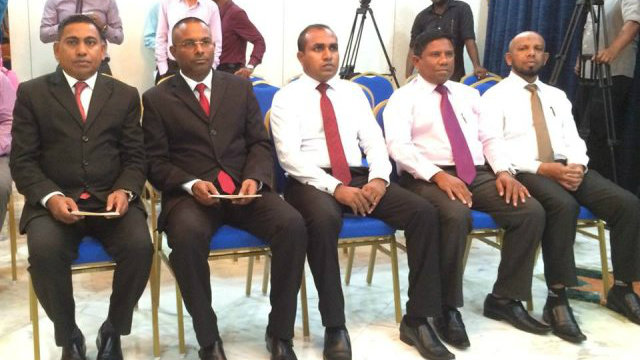Two criminal court judges who sentenced ex-president Mohamed Nasheed to 13 years in jail in a widely criticised trial have been appointed to the High Court today.
Judges Abdulla Didi and Sujau Usman took the oath of office at a surprise ceremony at the Supreme Court this morning.
Two seats on the nine-member bench have been vacant since the high court’s chief judge was demoted to the juvenile court in August, and another judge retired in February this year.
The appointment of new judges was stalled when the high court in October last year said the evaluation criteria was flawed.
But the Supreme Court on May 28 overturned the ruling, paving the way for Didi and Usman’s appointment.
The third judge in Nasheed’s terrorism trial was Judge Abdul Bari Yoosuf. He was awarded a discounted flat in a newly built luxury apartment complex in Malé.
The former chief judge Ahmed Shareef was suspended in 2013, shortly after the high court suspended court proceedings against Nasheed on charges of arbitrarily detaining a judge during his tenure. The high court was reviewing the composition of the bench overseeing the trial.
The Prosecutor General’s Office in February withdrew the lesser charges of arbitrary detention and filed new terrorism charges against Nasheed at the criminal court.
Evaluation criteria
The high court, in an October 2014 ruling, ruled that the criteria on evaluating a candidate’s educational qualification and experience was flawed and ordered the Judicial Services Commission to amend the criteria.
The 100-point mark sheet awarded 35 points for education, 30 points for experience, 10 points for ethical conduct and 25 points for an interview.
All candidates were to be put to a secret vote in the order of the candidates who received the highest points. The first candidates who received a majority in the vote would be appointed.
In evaluating the educational qualifications, a candidate with a degree in Islamic Shariah or a degree in common law would receive 20 points. But a candidate with a combined degree in Islamic Shariah and common law would receive 25 points.
Candidates with a masters or a doctoral degree would receive an additional five points each.
The criteria appeared to grade candidates on the title of their degrees, the high court said. For example, an individual who had a degree in common law may have done the same number of modules on Islamic Shariah as a candidate who had a combined degree in Islamic Shariah and common law.
The high court noted an individual who had done a degree in common law or Islamic Shariah, and held a masters, would receive 25 points, the same as an individual who had just done a degree in Islamic Shariah and common law.
The evaluation criteria for qualification awarded 30 points for ten years of experience as a judge, meaning it did not differentiate between candidates who had served as a judge for ten years or 20 years.
The appellate court said judges must be awarded points proportionate to the number of years they had served as judges.
The high court also ruled that the JSC cannot hold a secret vote to select candidates arguing the procedure was not transparent.
The Supreme Court, however, dismissed the high court’s ruling
Flawed trial
Foreign governments and international bodies have expressed concern over Nasheed’s 19-day trial, noting he was not given adequate time to prepare defense, barred from calling defense witnesses, and at times, denied legal representation.
The UN special rapporteur on independence of judges and lawyers, Gabriela Knaul said: “The speed of the proceedings combined with the lack of fairness in the procedures lead me to believe the outcome of the trial may have been pre-determined.”
Amnesty International said Nasheed’s sentencing “after a deeply flawed and politically motivated trial is a travesty of justice.”
The three judges who oversaw Nasheed’s trial also sentenced ex-defence minister Mohamed Nazim to 11 years in jail in a weapons smuggling charge.
The retired colonel said the weapons were planted at his home by rogue police officers on the orders of Tourism Minister Ahmed Adeeb.
Adeeb has denied the allegations.
Despite growing calls for Nasheed and Nazim’s release, President Abdulla Yameen said he has no constitutional authority to release the pair.
Nazim’s appeal at the high court is scheduled to begin on June 21.
Nasheed was unable to file an appeal after the criminal court delayed releasing required case documents within the shortened ten-day appeal period.
The government insists Nasheed can still file an appeal, but his lawyers say the law is silent on late appeals.
They argue that the Supreme Court in January has removed the high court’s discretionary powers to accept late appeals in the ruling that had shortened the 90-day appeal period to ten days.
Photo by Raajje TV
 (0)Dislikes
(0)Dislikes (0)
(0)
